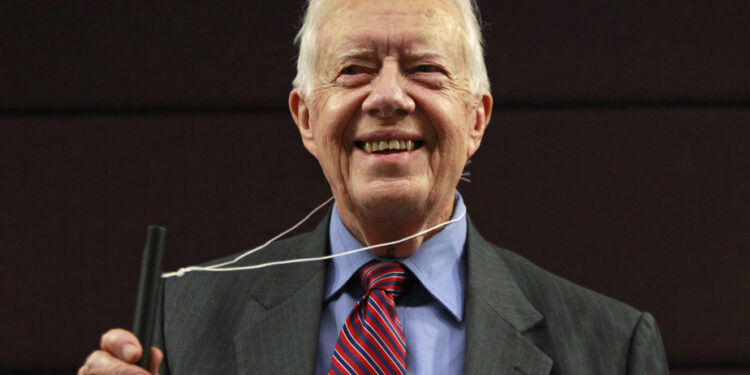(Washington) “Righteousness, righteousness, righteousness”: a few days before the inauguration of Donald Trump, former President Jimmy Carter is hailed as the symbol of a moral requirement that is disappearing in American political life .
Joe Biden repeated three times this word “decency”, a notion which suggests both integrity and decency, when journalists asked him on Sunday how the Republican president-elect could draw inspiration from his Democratic predecessor, who died in the age of 100 years.
His death “is a strong reminder that there are few honest and honest people left today,” regrets Jay Landers, an 82-year-old retiree met Monday by AFP in Plains, the former president’s hometown, where he came to pay homage to him.
The outgoing president, who will hand over power to his arch-rival on January 20, added: “Can you imagine Jimmy Carter commenting on the way people look or the way they talk? “.
Donald Trump often makes disparaging remarks about the appearance or speech of political or media figures who oppose him. During a speech in November 2015, for example, he made jerky gestures to mention a journalist suffering from a motor disability, which did not prevent him from winning the election a year later.
PHOTO RICK SCUTERI, CANADIAN PRESS ARCHIVES
President-elect Donald Trump
“Comforting presence”
Already at the end of his life, and even more so since his death, Jimmy Carter, 39th President of the United States (1977-1981) became the incarnation of a lost America, certainly embellished by nostalgia, where political exchanges were courteous and where morality, private as well as public, was still valued.
His presidency remains synonymous with bitter diplomatic failures and economic disappointments, and he has sometimes irritated his successors in the White House by commenting on their decisions in a manner considered accusatory or moralizing.
But his humanitarian commitments, his diplomatic mediations, in addition to his modest lifestyle and his long marriage to his wife Rosalynn, ended up making the Georgia Democrat a figure too respected to be openly criticized.
Jimmy Carter was “a fundamentally honest, transparent and comforting presence in the White House, and that’s what the United States needed after Watergate”, the political espionage affair that led to the fall of President Richard Nixon, analysis for AFP Barbara Perry, professor specializing in the history of American presidents at the University of Virginia.
But since then, “Americans have become completely insensitive to ethical considerations in political life,” asserts the researcher.
Eulogies like those reserved for the late president “tell us as much about ourselves as about the person being celebrated,” historian Jon Meacham commented on MSNBC.
Jimmy Carter was “someone imperfect, but who believed in the fundamental importance of personal ethics”, and whose death comes “at a moment in American political history when (this quality) is not essential for most people,” added this intellectual often consulted by Joe Biden.
American moral “crisis”
The boss of the Democratic senators, Chuck Schumer, insisted in a press release on the “goodness and humility” of the late president.
Tributes are also pouring into the Republican camp, where the emphasis is rather placed on the humanitarian actions or the faith of the former president.
“We were not on the same political side, but we have a lot in common, including the love of the Lord,” commented conservative senator Chuck Grassley on the social network X, for example.
In the same vein, another Republican senator, Mike Lee, praised “the great humanitarian actions and the deep fidelity to the Christian faith” of this fervent Baptist.
Jimmy Carter claimed that Donald Trump only won his first presidential election, in 2016, thanks to a Russian interference operation.
In July 1979, the Democrat had mentioned in a speech with the overtones of a premonitory sermon a “crisis of confidence” in the country and a moral shaking of Americans, “prey to a growing doubt about the meaning of (their) lives”, and tempted to take the “path of fragmentation and selfishness”.



